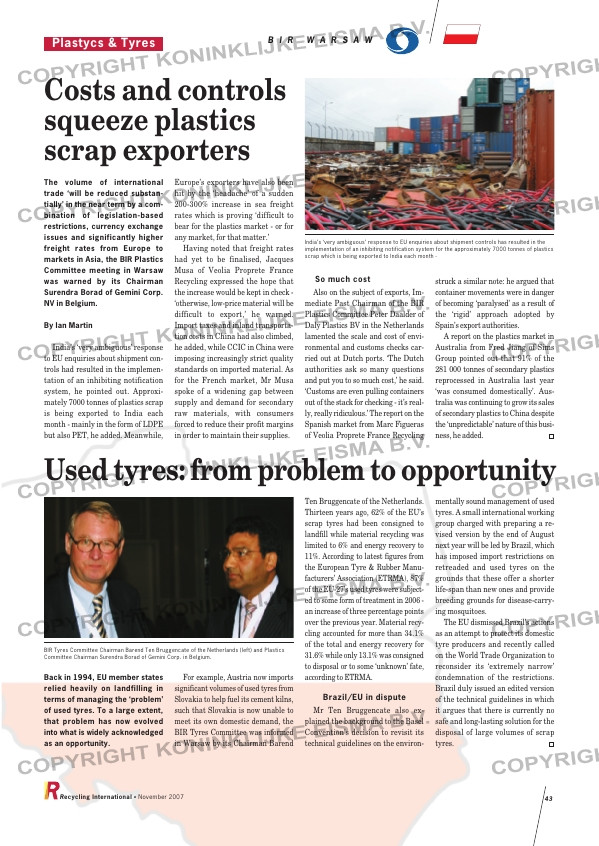Page 43 from: November 2007

The volume of international
trade ‘will be reduced substan-
tially’ in the near term by a com-
bination of legislation-based
restrictions, currency exchange
issues and significantly higher
freight rates from Europe to
markets in Asia, the BIR Plastics
Committee meeting in Warsaw
was warned by its Chairman
Surendra Borad of Gemini Corp.
NV in Belgium.
By Ian Martin
India’s ‘very ambiguous’ response
to EU enquiries about shipment con-
trols had resulted in the implemen-
tation of an inhibiting notification
system, he pointed out. Approxi-
mately 7000 tonnes of plastics scrap
is being exported to India each
month – mainly in the form of LDPE
but also PET, he added. Meanwhile,
Europe’s exporters have also been
hit by the ‘headache’ of a sudden
200-300% increase in sea freight
rates which is proving ‘difficult to
bear for the plastics market – or for
any market, for that matter.’
Having noted that freight rates
had yet to be finalised, Jacques
Musa of Veolia Proprete France
Recycling expressed the hope that
the increase would be kept in check –
‘otherwise, low-price material will be
difficult to export,’ he warned.
Import taxes and inland transporta-
tion costs in China had also climbed,
he added, while CCIC in China were
imposing increasingly strict quality
standards on imported material. As
for the French market, Mr Musa
spoke of a widening gap between
supply and demand for secondary
raw materials, with consumers
forced to reduce their profit margins
in order to maintain their supplies.
So much cost
Also on the subject of exports, Im-
mediate Past Chairman of the BIR
Plastics Committee Peter Daalder of
Daly Plastics BV in the Netherlands
lamented the scale and cost of envi-
ronmental and customs checks car-
ried out at Dutch ports. ‘The Dutch
authorities ask so many questions
and put you to so much cost,’ he said.
‘Customs are even pulling containers
out of the stack for checking – it’s real-
ly, really ridiculous.’ The report on the
Spanish market from Marc Figueras
of Veolia Proprete France Recycling
struck a similar note: he argued that
container movements were in danger
of becoming ‘paralysed’ as a result of
the ‘rigid’ approach adopted by
Spain’s export authorities.
A report on the plastics market in
Australia from Fred Jiang of Sims
Group pointed out that 91% of the
281 000 tonnes of secondary plastics
reprocessed in Australia last year
‘was consumed domestically’. Aus-
tralia was continuing to grow its sales
of secondary plastics to China despite
the ‘unpredictable’ nature of this busi-
ness, he added.
Recycling International • November 2007 43
Back in 1994, EU member states
relied heavily on landfilling in
terms of managing the ‘problem’
of used tyres. To a large extent,
that problem has now evolved
into what is widely acknowledged
as an opportunity.
For example, Austria now imports
significant volumes of used tyres from
Slovakia to help fuel its cement kilns,
such that Slovakia is now unable to
meet its own domestic demand, the
BIR Tyres Committee was informed
in Warsaw by its Chairman Barend
Ten Bruggencate of the Netherlands.
Thirteen years ago, 62% of the EU’s
scrap tyres had been consigned to
landfill while material recycling was
limited to 6% and energy recovery to
11%. According to latest figures from
the European Tyre & Rubber Manu-
facturers’ Association (ETRMA), 87%
of the EU-27’s used tyres were subject-
ed to some form of treatment in 2006 –
an increase of three percentage points
over the previous year. Material recy-
cling accounted for more than 34.1%
of the total and energy recovery for
31.6% while only 13.1% was consigned
to disposal or to some ‘unknown’ fate,
according to ETRMA.
Brazil/EU in dispute
Mr Ten Bruggencate also ex-
plained the background to the Basel
Convention’s decision to revisit its
technical guidelines on the environ-
mentally sound management of used
tyres. A small international working
group charged with preparing a re-
vised version by the end of August
next year will be led by Brazil, which
has imposed import restrictions on
retreaded and used tyres on the
grounds that these offer a shorter
life-span than new ones and provide
breeding grounds for disease-carry-
ing mosquitoes.
The EU dismissed Brazil’s actions
as an attempt to protect its domestic
tyre producers and recently called
on the World Trade Organization to
reconsider its ‘extremely narrow’
condemnation of the restrictions.
Brazil duly issued an edited version
of the technical guidelines in which
it argues that there is currently no
safe and long-lasting solution for the
disposal of large volumes of scrap
tyres.
BIR Tyres Committee Chairman Barend Ten Bruggencate of the Netherlands (left) and Plastics
Committee Chairman Surendra Borad of Gemini Corp. in Belgium.
Costs and controls
squeeze plastics
scrap exporters
Used tyres: from problem to opportunity
India’s ‘very ambiguous’ response to EU enquiries about shipment controls has resulted in the
implementation of an inhibiting notification system for the approximately 7000 tonnes of plastics
scrap which is being exported to India each month –
Plastycs & Tyres B I R W A R S A W
RI_037 BIR-Plastics:Opmaak 1 08-11-2007 10:02 Pagina 43



